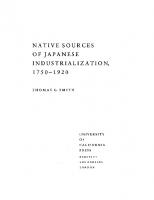Native Sources of Japanese Industrialization, 1750-1920 9780520908741, 0520908740
"Native Sources" is a collection of seminal essays on the demographic, economic, and social history of Tokugaw
123 4 54MB
English Pages 288 [290] Year 1989
Frontmatter
Acknowledgments (page ix)
Introduction (page 1)
1. Premodern Economic Growth: Japan and the West (page 15)
2. The Land Tax in the Tokugawa Period (page 50)
3. Farm Family By-Employments in Preindustrial Japan (page 71)
4. Peasant Families and Population Control in Eighteenth-Century Japan (page 103)
5. Japan's Aristocratic Revolution (page 133)
6. The Discontented (page 148)
7. "Merit" as Ideology in the Tokugawa Period (page 156)
8. Ōkura Nagatsune and the Technologists (page 173)
9. Peasant Time and Factory Time in Japan (page 199)
10. The Right to Benevolence: Dignity and Japanese Workers, 1890-1920 (page 236)
Index (page 271)
Recommend Papers

- Author / Uploaded
- Thomas C. Smith
File loading please wait...
Citation preview
A
aaa
¥ Zee ym Qe BOO K
The Philip E. Lilienthal imprint honors special books in commemoration of a man whose work at the University of California Press from 1954 to 1979 was marked by dedication to young authors and to high standards in the field of Asian Studies. Friends, family, authors, and foundations have together endowed the Lilienthal Fund, which enables the Press to publish under this imprint selected books in a way that reflects the taste and judgment of a great and beloved editor.
NATIVE SOURCES OF JAPANESE INDUSTRIALIZATION,
1750-1920 THOMAS C. SMITH
UNIVERSITY OF
CALIFORNIA
: PRESS
University of California Press Berkeley and Los Angeles, California
University of California Press, Ltd. London, England © 1988 by The Regents of the University of California
First Paperback Printing 1989 Library of Congress Cataloging-in-Publication Data Smith, Thomas C. (Thomas Carlyle), 1916— Native sources of Japanese industrialization, 1750—1920 / Thomas
C.p.Smith | cm.
“A Philip E. Lilienthal book” —Series t.p. Includes index. Contents: Premodern economic growth: Japan and the West—The land tax in the Tokugawa period-—Farm family by-employments in preindustrial Japan——-Peasant families and population control in eighteenth-century Japan—Japan’s aristocratic revolution—The discontented—‘“Merit” as ideology in the Tokugawa period—Okura Nagatsune and the technologists—Peasant time and factory time in Japan—tThe right to benevolence: dignity and Japanese workers, 1890—1920. ISBN 0-5 20-05837-2 (alk. paper). ISBN 0-520-06293-0 (pbk.)
1. Japan—Economic conditions. 2. Japan-—Social conditions. 3. Japan—lIndustries—History. I. Title. HC462.8617 1988
330.952—dc19 87-27470 CIP
Printed in the United States of America
3 45 6 7 8 9
TO J.M.S.
CONTENTS
Acknowledgments Introduction ixI 1
Premodern Economic Growth: Japan and the West 15 2
The Land Tax in the Tokugawa Period 50
4, 3
Farm Family By-Employments in Preindustrial Japan 71 Peasant Families and Population Control in
Eighteenth-Century Japan 103 5
Japan’s Aristocratic Revolution 133
The Discontented 148 6
7
“Merit” as Ideology in the Tokugawa Period 156 Vil
Vill CONTENTS
8
Okura Nagatsune and the Technologists 173 9
Peasant Time and Factory Time in Japan 199 10
1890-1920 2.36
Index 271
The Right to Benevolence: Dignity and Japanese Workers,
ACKNOWLEDGMENTS
In the course of writing these articles, | have had more help and encouragement from friends and strangers than | can properly acknowledge in a short space. I hope I have expressed my gratitude for these kindnesses in print and less public ways sufficiently that 1 may be excused from listing names. It would be a very long list and lists are poor acknowledgment. Instead, I would like to use the occasion to express my special gratitude to two friends for things that have no ostensible connection to these essays but much to do with them. I am deeply indebted to my undergraduate teacher Harry Girvetz, who first excited me with the possibilities of history by abolishing the hard-and-fast distinction in my mind between what has been and what is; and to my colleague Irwin Scheiner, whose gift for friendship and intellectual discourse has made a difference in life for me as for many others.
It is an honor to have this book become the first in a series to be published by the University of California Press in memory of Phil Lilienthal, whom I liked and admired from our first meeting in Palo Alto in 1948. In this and other ways, friends at the press have made the production of this book a pleasure; | owe special thanks to Betsey Scheiner, who in editing the manuscript rarely put pencil to a sentence without improving It.
1X
Aki 48 Mikawa 30
Awa 42 Mimasaka 57 Awa (Boéshu) 13 Mino 23 Awaji 41 Musashi 15 Bingo 50 Mutsu 1 Bitchi 49 Nagato 47 Bizen 51 Noto 17 Bungo 63 Omi 22 Buzen 62 Osumi 69 Chikugo 64 Owari 31 Chikuzen 61 Rikuchi 2
Echigo 16 Rikuzen 4
Echizen 20 Sagami 14 Etcha 18 Sanuki 45 Harima 52 Satsuma 68
Hida 24 Settsu (Sessha) 40 | Higo 66 Shima 34
Hitachi 8 Shim6sa_ 11 Hizen 65 Shimotsuke 9 Hoki 58 Shinano (Shinsha) 25
Iga 32 Sud 4655 Suruga 27 oA Hyuga Inaba 56 Tajima67 Ise 33 Tamba 53
Iwaki 6 43Tango 54 if Iwami 60 Tosa Iwashiro 7 Totomi 29
Iyo 44 Izumi 3728 Wakasa 21 Ugo Izu Uzen 5 4 393asaaN Izumo 59 Yamashiro Kaga 19 Yamato 36 ea Wp Kawachi Kazusa 12 38 Oo cy 54 ter: 21 iy
Kai 26 m Ya
Kii (Kishi) Xe, aX Kozuke 10355 te
![Sources of Japanese Tradition: 1600 to 2000 [Abridged]
0231139160, 9780231139168](https://ebin.pub/img/200x200/sources-of-japanese-tradition-1600-to-2000-abridged-0231139160-9780231139168.jpg)

![Japanese Industrialization and Its Social Consequences [Reprint 2019 ed.]
9780520326033](https://ebin.pub/img/200x200/japanese-industrialization-and-its-social-consequences-reprint-2019nbsped-9780520326033.jpg)
![Driving a Bargain: Automobile Industrialization and Japanese Firms in Southeast Asia [Reprint 2020 ed.]
9780520325043](https://ebin.pub/img/200x200/driving-a-bargain-automobile-industrialization-and-japanese-firms-in-southeast-asia-reprint-2020nbsped-9780520325043.jpg)


![Generative Approaches to the Acquisition of English by Native Speakers of Japanese [Reprint 2011 ed.]
9783110892468, 9783110176599](https://ebin.pub/img/200x200/generative-approaches-to-the-acquisition-of-english-by-native-speakers-of-japanese-reprint-2011nbsped-9783110892468-9783110176599.jpg)


